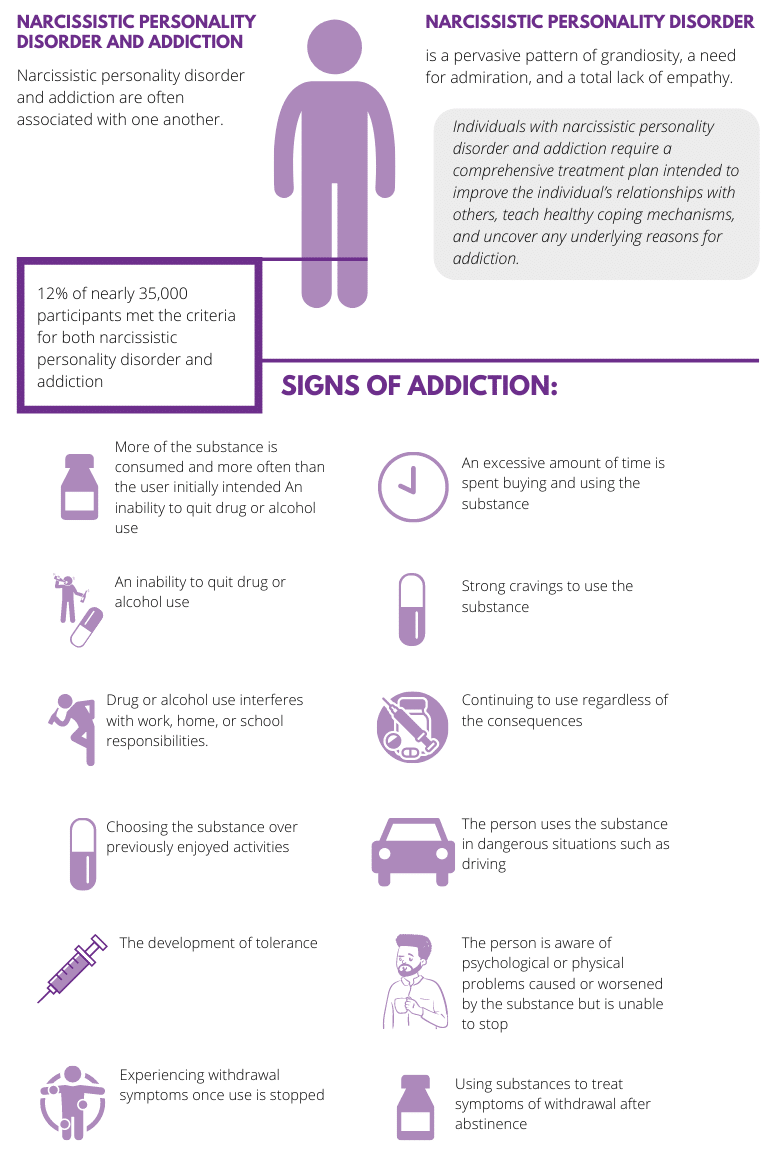Narcissistic personality disorder (NPD) and addiction co-occur frequently. Some experts believe that NPD and addiction are related due to substances helping the individual cope with negative feelings associated with a narcissistic personality disorder. In similar fashion to addiction, narcissistic personality disorder leads to feelings of isolation as well as dangerous behaviors and coping mechanisms. Additionally, individuals with narcissistic personality disorder are often distrustful of, insecure about, or feel superior to people around them. This causes these individuals to be unable to connect with their peers or form genuine relationships. However, both disorders are treatable. If you or a loved one suffer from both narcissistic personality disorder and addiction, you must seek treatment for both conditions simultaneously in order for the treatment program and your recovery to be effective. With the right treatment, recovery is possible.
Table of Contents
ToggleWhat is Narcissistic Personality Disorder?
By definition, a narcissistic personality disorder (NPD) is a pervasive pattern of grandiosity, a need for admiration, and a total lack of empathy. To explain further, individuals with NPD display a long-term pattern of exaggerated feelings of self-importance, an excessive need for admiration, and a lack of empathy toward other people. While individuals with NPD appear selfish and inconsiderate, this stems from extremely fragile self-esteem that’s vulnerable to the slightest criticism. Narcissistic personality disorder causes issues in many areas of an individual’s life, such as relationships, work, school, or financial affairs.
Signs and Symptoms of NPD
For an individual to be diagnosed with a narcissistic personality disorder, they must meet certain diagnostic criteria. If you or a loved one display 5 or more of the following signs and symptoms, you may be suffering from NPD:
- Has an inflated sense of importance, expects to be viewed as superior, and exaggerates own skills
- Obsesses over boundless success, intelligence, beauty, power, or ideal love
- Believes that they are unique and “special” and shouldn’t associate with others who aren’t
- Needs an inordinate amount of admiration and attention
- Feels entitled and expects better treatment than others
- Takes advantage of others for personal gain
- Fails to display empathy
- Displays envy or suspect that others envy him or her
- Has an arrogant or pompous attitude
It is important to note that some of the previously mentioned traits can be possessed by individuals who do not suffer from NPD. Many high-functioning individuals display several of the mentioned personality traits, however, they do not qualify for NPD. To distinguish a healthy individual from an individual suffering from NPD, you must notice maladaptive and problematic behaviors that cause significant life impairment.
Personality Traits of NPD
Individuals with a narcissistic personality disorder often appear pretentious, boastful, and emotionally void. If you believe you or a loved one are suffering from NPD, you must look for the signs and traits of this disorder. Individuals with narcissistic personality disorder require psychiatric treatment in order to successfully manage their symptoms and live a successful life.
People with a narcissistic personality disorder often display the following personality traits:
- Pretentious.
- Boastful.
- Devaluing of others.
- Preoccupied with how they are regarded by others.
- Furious when they are not catered to.
- Contemptuous when others discuss their troubles or feelings.
- Oblivious to the pain they inflict on others.
- Emotionally cold.
- Jealous.
- Patronizing.
- Snobbish.
- Extremely sensitive to criticism.
While these are common traits of narcissistic personality disorder, not everyone suffering from this mental health condition will display all of these signs. In other words, NPD presents itself differently from person to person.
Narcissistic Personality Disorder and Addiction
Narcissistic personality disorder and addiction are often associated with one another. According to a study, 12% of nearly 35,000 participants met the criteria for both narcissistic personality disorder and addiction. Additionally, a little over 64% of individuals with NPD admitted to abusing substances at some point in their life. Individuals with narcissistic personality disorder and addiction require a comprehensive treatment plan intended to improve the individual’s relationships with others, teach healthy coping mechanisms, and uncover any underlying reasons for addiction.

Treatment for Narcissistic Personality Disorder and Addiction
When choosing a treatment center for co-occurring disorders such as narcissistic personality disorder and addiction, there are a variety of factors to consider. For example, it is important to think about the cost, the location, the qualifications of the staff, and the amenities offered at the program. Individuals with co-occurring disorders like narcissistic personality disorder and addiction should always attend a dual-diagnosis treatment center.
Dual-diagnosis inpatient programs like Agape Treatment Center include the following key elements:
- Intake evaluation. Mental health professionals will evaluate you for any additional psychiatric diagnoses and assess the nature of your addiction and narcissistic personality disorder.
- Detox. Before beginning any therapy or counseling, detoxing from drugs or alcohol in a safe and comfortable setting is necessary. Patients will receive 24-hour comfort care as well as medication, if necessary.
- Medical maintenance. In some cases, patients may be prescribed medication to help prevent relapse, decrease cravings, or manage symptoms of mental health disorders.
- Therapy. Therapists work with patients to redirect any negative thoughts, feelings, and behaviors while teaching you healthy coping skills.
- Group counseling. Experienced mental health professionals facilitate group counseling sessions that teach patients how to interact with others in a positive manner and use healthy social skills.
- Aftercare planning. Therapists and staff will collaborate to create an effective plan for patients to follow once they complete their treatment program. This plan will include relapse prevention tactics and ongoing recovery programs.
If you or a loved one are currently suffering from narcissistic personality disorder and addiction, it is time to seek help. With the combination of detox, therapy, medication management, group counseling, and aftercare planning- recovery is possible. Contact Agape Treatment Center today to learn more about the treatment of co-occurring disorders.







